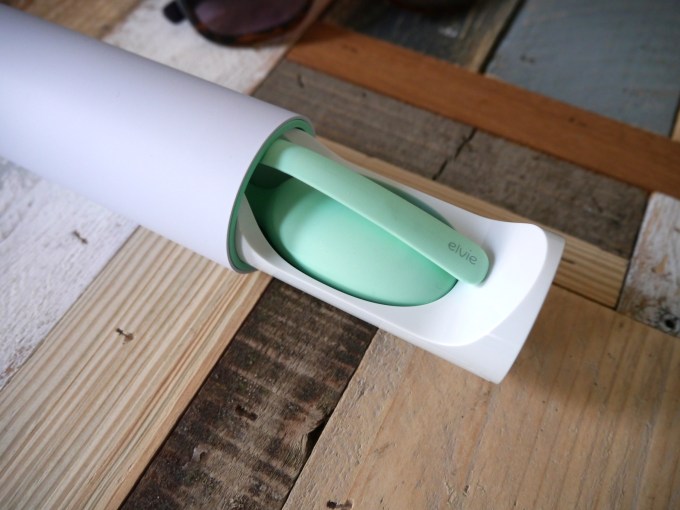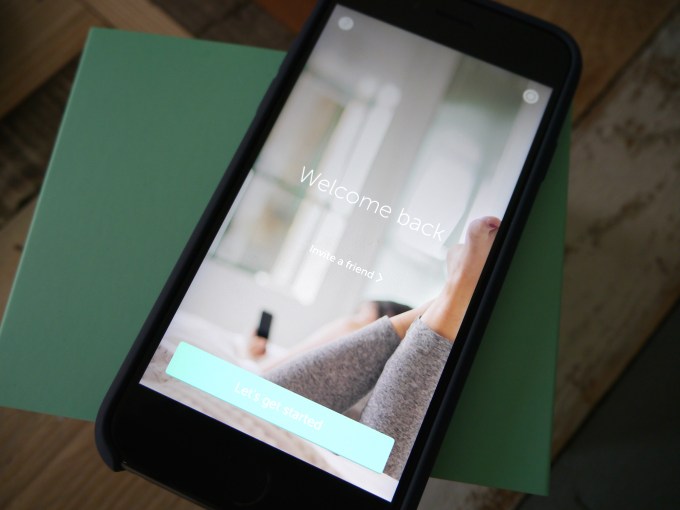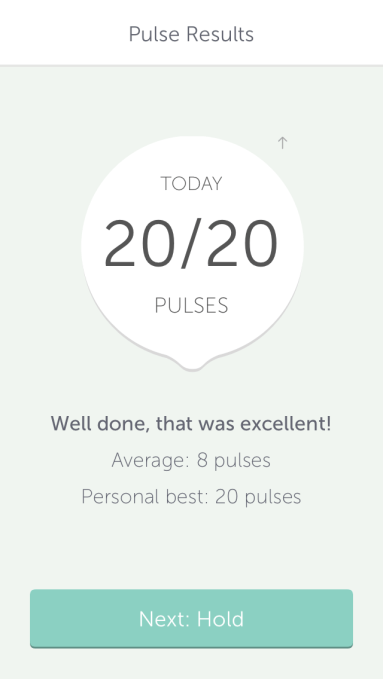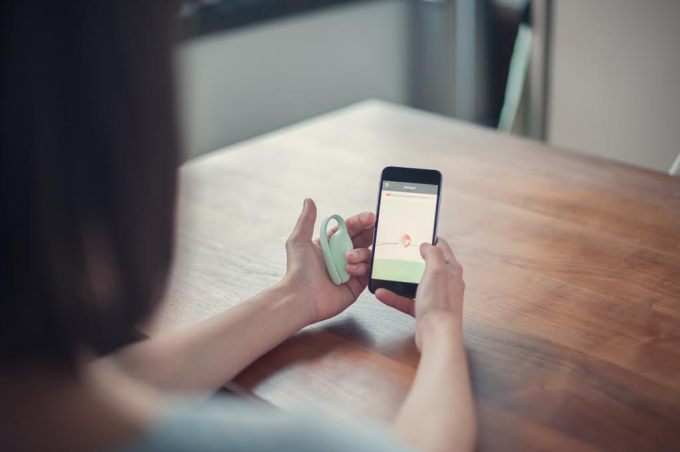The life of a technology journalist inexorably involves a lot of gadgetry. And while I can appreciate the sleek beauty of new Apple hardware as much as the next person, I don’t routinely get excited by the prospect of unboxing any other new gizmo just because. But when the courier handed over the small white bag containing Elvie I was uncharacteristically eager to open it up — because this is a rare beast indeed: a connected device designed by women, for women.
It’s not hyperbole to say Elvie is a new breed of connected device. It’s indicative of the lack of smart technology specifically — and intelligently — addressing women. Given the male-dominated tech space that’s hardly a surprise. Let’s call it an ‘on-going disappointment’. But make no mistake, it’s also a missed opportunity.
Bottom line: there are huge opportunities for technology businesses to be built that intelligently address women’s needs. Women are routinely early adopters of all sorts of digital services. So if you’re making something of genuine utility to an underserved 50 per cent of the population chances are your product won’t be languishing on the shelves for long.
Only last week Berlin-based period and fertility tracker app Clue raised a $7 million Series A round of funding. Its ambition is to build “a platform for female health” — using the data its users are contributing to conduct and support research into health and lifestyle issues that specifically affect women.
Chiaro, the London-based startup behind Elvie, has similarly expansive aims, with plans to build out a portfolio of devices and services for women. It has raised more than $3 million at this early stage — with the likes of Lars Rasmussen and Nicole Junkermann among its super angel investors, and Lulu’s Alexandra Chong on its board — and Elvie is its first device and first step towards building a technology lifestyle brand for women. Expect to see more such savvy, female-led startups appearing — as both Chiaro and Clue are.
Real-time feedback as you exercise
So what exactly is Elvie? It’s a connected pelvic floor exerciser which gives the user real-time feedback as they exercise. Think of it as a non-passive wearable. It gathers and charts your data to track performance over time, as many fitness wearables do, but it also allows for guided pelvic floor exercising in real-time. Which is core to its proposition.
Point being it’s not exactly easy to know whether you’re correctly performing pelvic floor lifts — given there’s no visual feedback from the muscle. (A male colleague referenced the “dark and mysterious pelvic floor” when I mentioned my Elvie review unit had arrived. But even for women there’s plenty of mystery around this muscle, given it’s been so hard to quantify it — up to now).
Exercising the pelvic floor is a good idea for lots of reasons. Motivation to exercise can be associated with childbirth preparation or post-natal recovery; bladder control issues; lifestyle goals focused on improving core fitness (lifting the pelvic floor can be involved when you practice pilates and yoga, for instance). Exercising the pelvic floor can also be a motivator for women of any age wanting to improve sensation during sex. Safe to say, there are a host of health, fitness and lifestyle benefits to tap into here.
Chiaro kicked off pre-orders for Elvie just under a year ago, and is now shipping the first devices to buyers. The exerciser retails for £149 (~$230), and is currently sold direct via the Elvie website. TechCrunch was sent one of the first batch — keep reading for our early impressions.

How Elvie works
The Elvie device works in conjunction with a companion app. The two communicate via Bluetooth — the device’s BT radio remains outside the body so there’s no chance of the signal being blocked during use (in a very cute and clever piece of industrial design the radio is located in the Elvie’s tail).
There are no buttons on the exerciser, as you’d hope given it’s designed for internal use. Indeed, the entire pebble-shaped device is encased in medical grade silicone — giving it a smooth, seamless unibody for hygiene and comfort. Since Elvie is designed to sense force applied almost anywhere on its body the whole device is also effectively one big button. (The user activates the link between app and Elvie by squeezing the device with their pelvic floor muscles once they’ve inserted it into their vagina — at which point the app will offer to guide them through a workout.)
While it’s big for a button, Elvie is deliberately smaller than the average pelvic floor exerciser — Chiaro claims it’s as much as 3x smaller than alternatives. (One rival connected device is the Kgoal — which a Verge reviewer criticized as too large, finding it painful to use.)
During Elvie’s product development and testing, co-founder Tania Boler says the team were continually told by women that they wanted the device to be small. (For those who want a slightly larger exerciser there is a silicone cap accessory in the box which fits snuggly over Elvie’s head to size it up a little.)
Hidden inside Elvie’s smooth silicone exterior are a series of force sensors which allow the device to measure the user’s pelvic floor as they squeeze and relax the muscle. Muscle activity is visualised in real time in the app — denoted by the vertical position of a gem icon on the screen.
Each Elvie training session lasts about five minutes and involves a series of exercises that are much like basic games — except you’re controlling the games with your pelvic floor muscle, rather than your fingers. Trust me it’s pretty fun.
I found the Elvie super simple to set up and start using. Almost too simple, if anything. Chiaro has created a measure it calls LVs to quantify your pelvic floor lift strength. But it’s not immediately clear what a specific score means. You’re presumably aiming for a higher LVs score — to denote more powerful lifts — but a little more information/context here would be helpful.
Each training session starts with an attempt to lift the gem as high as you can to calibrate the peak force you’re aiming for for that particular session. You’re then led through a series of different exercises, depending on your current level (and your initial lift). The app offers three different levels: beginner, intermediate and advanced. Beginner is the default but the user can switch to another level whenever they like if they wish.

Exercises include trying to lift and maintain the gem above a set LV force line for a certain number of seconds; pulse-lifting to hit individual targets as the screen scrolls along (which reminded me of headbutting objects in Mario to try to collect coins); performing a single controlled lift to follow a variable target line as the screen scrolls; and pulsing your pelvic floor as quickly as you can to clear a stack of non-moving targets.
More exercises will be devised for future updates as they continue development of the app, says Boler — and as they learn more about pelvic floor performance from Elvie users.
“The pelvic floor muscle is a complicated part of the body and universities have never had such quality and quantity of data before. Our understanding of its function will increase significantly,” she notes.
Boler adds that Elvie is also able to sense if a user is pushing down (an incorrect action) rather than lifting their muscle — and will guide those users through some visualisations to try to get them lifting correctly.
“With Elvie, we will soon be able to detect if a woman is standing or lying down when exercising and use this to make sure that each person’s target are meaningful,” she adds. “The most important thing is that exercising becomes motivating so the measurements will need to keep improving.”
Quantification + motivation
One thing that’s clear, having tested Elvie myself, is there is a lot of variation in how the pelvic floor performs, day to day, even hour to hour. Boler notes it can be different at different times of day, or depending on your hormone or stress levels. So the idea of a single LV ‘score’ is potentially problematic — unless it’s a median figure based on cumulative usage over a reasonable amount of time.
Chiaro says it doesn’t expect users to see changes on a daily basis but rather — “based on other muscle building programs” — it’s expecting strength gains to occur “over a matter of weeks” (an expectation which it says may be revised as it gets more user data).
It’s perhaps also problematic to talk in terms of levels like beginner, intermediate and advanced — which sets up an expectation of smooth, linear progress. In reality an Elvie user is most likely going to experience lots of variety every time they exercise. For example I sometimes found certain exercises within the beginner program challenging, yet certain advanced exercises seemed really easy. So such simplistic labels aren’t perhaps an ideal way to categorize such a variable muscle.

Every woman will be different, and will likely experience plenty of difference even within their own performance, day to day. So quantification of this ‘mysterious muscle’ is certainly trickier than the average fitness measure.
Regardless, Boler reiterates that Elvie users will see progression through regular exercise. But she agrees there is something of a balancing act in managing users’ expectations, and making sure they remain motivated — and crucially don’t get demoralised along the way.
Currently the app quantifies the user based on their own daily best, as well as keeping track of their overall personal best and charting progress on individual exercise measures (such as ‘hold’, ‘speed’ and ‘pulse’).
“Over time, there will be upwards trends on strength gains, endurance, precision,” she tells TechCrunch. “We were also worried that day-to-day measurement could be demoralising which is why we introduced a calibration at the start of each workout. This then sets the targets and your main strength score (on the daily tracking) as the percentage of target reached so that you focus on doing the best you can that day.”
“The main focus from beginner to advanced is building up endurance and strength and then only finally beginning to bring in more precision,” she adds.
On the comparative data front, Boler says they are working on providing users with “some relative grouping for women similar to themselves” — provided they can do this in a way that remains “motivational”. Inevitably users have been asking to know their overall ‘LV score’ to understand how they measure up to other women. So turning the data they are getting into a meaningful comparative measure — in a way that’s both useful but remains fun — is going to be a priority for Chiaro from here on in.
Are there any specific health risks from using Elvie? Pushing down is one potential problem, as noted above, but one the device is specifically designed to identify and encourage the user to correct. Over-tensing the pelvic floor can also lead to a condition called hypertonicity, according to Boler — which is why she says the app places as much emphasis on encouraging users to relax their pelvic floor, as well as instructing them to lift/squeeze.

The Elvie wearable (for indeed, it is ‘worn’ internally) is made of medical grade silicone so shouldn’t cause problems with irritation. It’s very easy to clean — just a case of rinsing under the tap with warm water — and comes with a cylindrical storage case that doubles as an induction charger. Just plug the USB cable into a power source to charge Elvie while it’s resting inside.
The product design is thoughtful and discreet. Happily there is also zero pink on the hardware and its packaging — so full marks for not patronising female users on the color front. The companion app is similarly discreet and thoughtfully designed (app design was outsourced to London-based digital design studio ustwo, of Monument Valley fame).
I found the in-app instructions generally easy to follow, although the app does have a basic/MVP feel at this early stage. Adding more exercises and opt-in comparative games/challenges is also on the to-do list, says Boler — now that they’re in a position to start feeding proper user data in to shape the app experience.
Who is Elvie for?
Early Elvie buyers are overwhelmingly female, as you’d expect, with 87 per cent of pre-orders coming from women. The 13 per cent of male pre-orderers were “mostly” gifting an Elvie. And half of those are fathers with more than two children. “This shows us that a significant number of men are engaged with, and are this intimate feminine issue,” is how Chiaro is interpreting this early data-point.
Of the early female buyers, a majority (58 per cent) are mothers. The 30- to 49-year-old age group was the largest group of pre-orderers, accounting for around 40 per cent of early sales. While the over 50s made up a fifth of pre-orders, and the 20- to 29 age group accounted for just under a fifth (19 per cent).
In terms of reason for purchase, between 30 to 40 per cent of early Elvie buyers say use is to address a pre-existing problem, but the majority (up to 60 per cent) say they were motivated to purchase by “prevention” or wanting “faster recovery”. Location wise, the U.K. and the U.S. are the biggest markets for Elvie at this stage, accounting for 60 per cent of pre-orders — with a 50:50 split between the two.
In my case, I am most interested in the real-time feedback element of Elvie. I don’t own a whole lot of wearables. I do have a Sports watch (a gift) for running but I mostly use this for the real-time pace/distance/time elapsed feedback, as it allows me to adjust a run in real-time. Dashboards of data after the fact are generally less interesting to me — frankly I’d rather be spending my time running than geeking out over that sort of granular data.
So — when it comes to Elvie — another real-time measure that my muscles can act on immediately? Well, now you’re talking…





































Comment